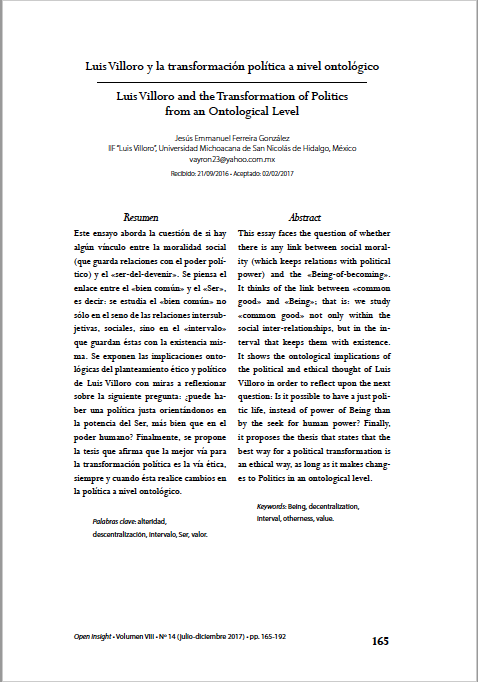Luis Villoro and the Transformation of Politics from an Ontological Level
Abstract
Received: 21/09/2016 • Accepted: 02/02/2017 This essay faces the question of whether there is any link between social morality (which keeps relations with political power) and the «Being-of-becoming». It thinks of the link between «common good» and «Being»; that is: we study «common good» not only within the social inter-relationships, but in the interval that keeps them with existence. It shows the ontological implications of the political and ethical thought of Luis Villoro in order to reflect upon the next question: Is it possible to have a just politic life, instead of power of Being than by the seek for human power? Finally, it proposes the thesis that states that the best way for a political transformation is an ethical way, as long as it makes changes to Politics in an ontological level.References
Arendt, H. (1997). ¿Qué es la política? Barcelona: Paidós.
Arendt, H. (2009). La condición humana. Buenos Aires: Paidós.
Arendt, H. (2003). Conferencias sobre la filosofía política de Kant. Barcelona: Paidós.
Aristóteles. (1942). Moral a Nicomaco. Argentina: Espasa Calpe.
Aristóteles. (2007). Metafísica. México: Porrúa.
Deleuze, G. y Guattari, F. (1985), El Anti Edipo. Capitalismo y esquizofrenia. Barcelona: Paidós.
Donati, P. (1996). “Lo postmoderno y la diferencia de lo universal”, en Giner y Scartezzini, Coord. Universalidad y diferencia. Madrid: Alianza, pp. 125-135.
Ferraris, M. (2013). Manifiesto del nuevo realismo. Madrid: Biblioteca Nueva.
Husserl, E. (1984). Crisis de las ciencias europeas y la fenomenología trascendental. México: Folios Ediciones.
Kant, I. (2007). Crítica del juicio. Madrid: Tecnos.
Larroyo, F. (1976). “Estudio introductivo. Descartes, fundador del racionalismo, en Descartes. Discurso del método; Meditaciones Metafísicas; Reglas para la dirección del espíritu, Principios de la filosofía. México: Porrúa, pp. IX-XX.
Lévinas, E. (1987). Totalidad e infinito. Ensayo sobre la exterioridad. Salamanca: Sígueme.
Marx, C. (1979). Manifiesto del Partido Comunista. URSS: Editorial Progreso.
Merleau-Ponty, M. (1993). Fenomenología de la percepción. Barcelona: Planeta Agostini.
Nietzsche, F. (2009). El anticristo. Madrid: Alianza.
Platón. (2009). Diálogos. México: Porrúa.
Ramírez, MT. (2011). Humanismo para una nueva época. Nuevos ensayos sobre el pensamiento de Luis Villoro. México: Siglo XXI/Universidad Michoacana de San Nicolás de Hidalgo.
Rancière, J. (1996). El desacuerdo. Política y filosofía. Buenos Aires: Ediciones Nueva Visión.
Richir, M. (2012). “El sentido de la fenomenología”. En Investigaciones Fenomenológicas, 9, pp. 315-332.
Villoro, L. (1962). Páginas filosóficas. México: Universidad Veracruzana.
Villoro, L. (1975). Estudios sobre Husserl, México: Universidad Nacional Autónoma de México.
Villoro, L. (1982). Creer, saber, conocer. México: Siglo XXI.
Villoro, L. (1995). En México entre libros. Pensadores del siglo XX. México: El Colegio Nacional/ Fondo de Cultura Económica.
Villoro, L. (1997). El poder y el valor. Fundamentos de una ética política. México: Fondo de Cultura Económica.
Villoro, L. (1998). Estado plural, pluralidad de culturas. México: Paidós.
Villoro, L. (2006). Vislumbres de lo otro. Ensayos de filosofía de la religión. México: Verdehalago.
Villoro, L. (2007). Los retos de la sociedad por venir. México: Fondo de Cultura Económica.
Villoro, L. (2011). “La realidad transfigurada”. En Devenires 23, pp. 7-11.





